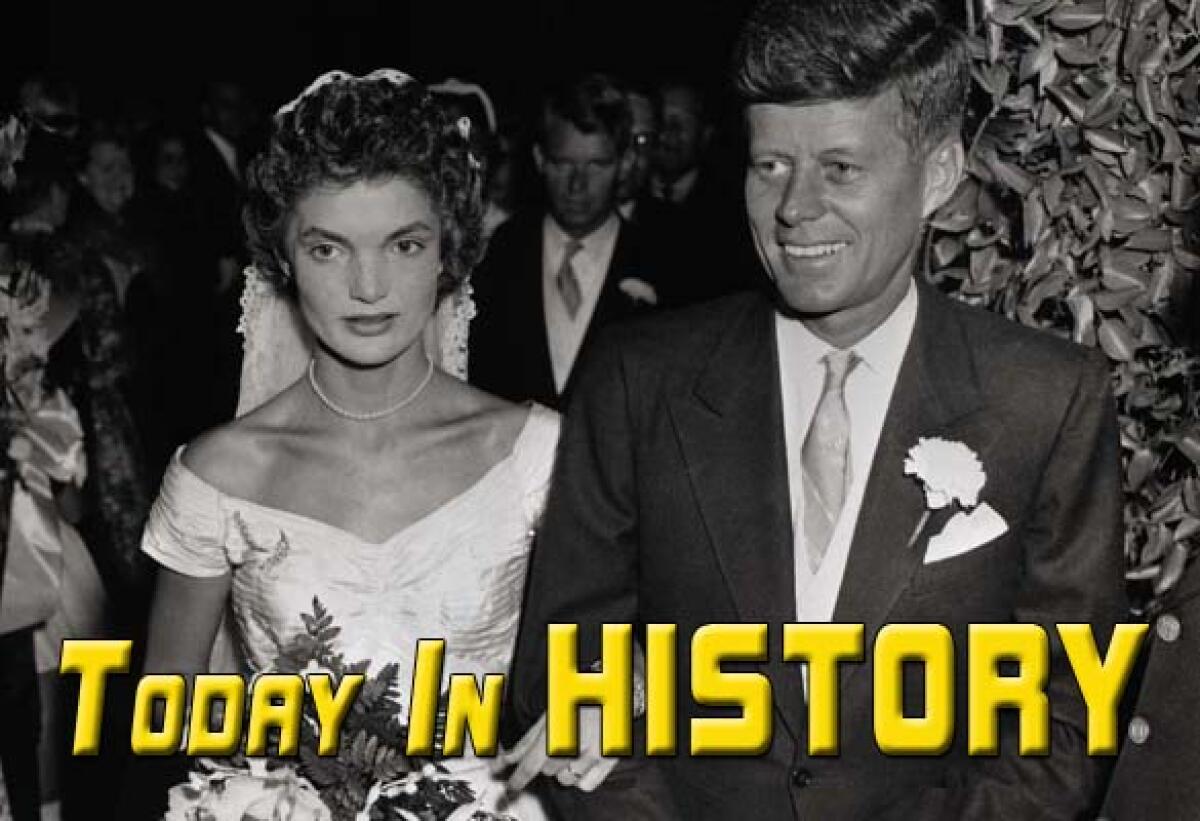- Thursday, 29 January 2026
- Have a HOT TIP? Call 704-276-6587 or E-mail us At LH@LincolnHerald.com
Today In History – September 12
There are 110 days remaining until the end of the year.

Today in History in 1953 John F. Kennedy marries Jacqueline Lee Bouvier in Newport, Rhode Island.
The on this day in history archives at “Simple English Wikipedia, the free encyclopedia” contains over 200,000 events, birthdays and deaths from 6,000 years of history. Here is a roundup of a few of them:
September 12 is the 255th day of the year (256th in leap years) in the Gregorian calendar. There are 110 days remaining until the end of the year.
EVENTS
1185 – Byzantine Emperor Andronikos I Komnenos is brutally put to death in Constantinople.
1309 – First Siege of Gibraltar during the Spanish Reconquista.
1556 – Charles V, Holy Roman Emperor gives up the throne for his brother, Ferdinand I, Holy Roman Emperor.
1609 – Henry Hudson explores the Hudson River.
1683 – Battle of Kahlenberg: Forces of John III Sobieski of Poland surprise Ottoman Empire forces under Kara Mustafa, defeating them decisively.
1689 – Tsar Peter I of Russia assumes absolute power.
1814 – War of 1812: Battle of North Point - An American detachment halts the British land advance to Baltimore, Maryland.
1847 – Mexican-American War: The Battle of Chapultepec begins.
1848 – Switzerland becomes a federal state.
1857 – The ship SS America sinks about 160 miles off Cape Hatteras, North Carolina, with 426 people drowning. It was carrying gold from the California Gold Rush
1861 – American Civil War: Battle of Cheat Pike in Virginia.
1885 – Arbroath F.C. 36-0 Bon Accord: This scoreline in Scotland is the highest-recorded in professional football.
1890 – Salisbury, Rhodesia (now Harare, Zimbabwe) is founded.
1905 – Japanese battleship Mikasa sinks after a munitions explosion. Out of the 935 men on board, 256 are killed and 343 injured.
1905 – Copenhagen town hall is inaugurated in Denmark.
1906 – Newport Transporter Bridge is opened in Newport, south Wales.
1910 – First performance of Gustav Mahler's Symphony Number 8, in Munich.
1918 – British passenger ship Galway Castle is torpedoed by a German U-boat off Land's End, Cornwall, England, killing 143 people.
1920 – The 1920 Summer Olympics in Antwerp begins.
1928 – A hurricane in Guadeloupe kills 1,200 people.
1933 – Leó Szilárd has the idea of a nuclear chain reaction.
1940 – World-famous cave paintings are discovered in the Lascaux in southern France.
1940 – An explosion at the Hercules Powder Company plant in Kenil, New Jersey kills 51 and injures over 200.
1942 – World War II: RMS Laconia, carrying civilians, Allied soldiers, and Italian POWs, is torpedoed off the coast of West Africa, with a heavy loss of life.
1942 – World War II: First Day of the Battle of Edson's Ridge during the Guadalcanal Campaign. US Marines protecting Henderson Field in Guadalcanal, Solomon Islands, are attacked by Imperial Japanese forces.
1943 – World War II: Benito Mussolini is rescued from house arrest on the Gran Sasso in Abruzzi, led by German commandos under Otto Skorzeny.
1944 – World War II: American troops enter Germany near Trier.
1948 – Invasion of the State of Hyderabad by the Indian army on the day after the death of Pakistan's leader Muhammad Ali Jinnah.
1949 – Theodor Heuss becomes the 1st President of the Federal Republic of Germany.
1953 – John F. Kennedy marries Jacqueline Lee Bouvier in Newport, Rhode Island.
1958 – Jack Kilby demonstrates the first integrated circuit.
1959 – Showing of the first episode of Bonanza, first regularly scheduled television programme presented in colour.
1959 – The Soviet Union launches the Lunik II rocket.
1959 – Heinrich Lübke becomes the 2nd President of the Federal Republic of Germany.
1961 – The African and Malagasy Union is founded.
1964 – The Canyonlands National Park in Utah is created.
1966 – Gemini 11, of NASA's Gemini program, is launched.
1970 – Palestinian terrorists blow up three hijacked airliners in Jordan. Passengers are held at secret locations in the capital city, Amman.
1974 – Ethiopian Emperor Haile Selassie I is deposed in a military coup.
1977 – Anti-Apartheid activist Steve Biko dies in police custody.
1979 – Indonesia is struck by a magnitude 8.1 earthquake.
1980 – A military coup occurs in Turkey.
1988 – Hurricane Gilbert hits Jamaica.
1990 – The Faroe Islands national football team scores a surprise 1-0 win over the Austria national football team. The Faroese players are celebrated as heroes after their return home from the match.
1990 – East Germany's national football team plays its last-ever match, winning 2-0 against the Belgium national football team.
1992 – NASA's Space Shuttle Endeavour is launched on the STS-47 mission. On board are Mae Carol Jemison (first African American woman in space), Mamoru Mohri (first Japanese citizen on a US spaceship), and Mark Lee and Jan Davis (first married couple in space).
1992 – Shining Path leader Abimael Guzman is arrested in Peru, by special forces.
1994 – Frank Eugene Corder crashes a single-engine Cessna 150 light aircraft into the West Wing of the White House in Washington, DC, killing himself.
1999 – Indonesia announces it will allow international peacekeepers into East Timor.
From 2001
2003 – The UN lifts sanctions against Libya.
2003 – US Forces mistakenly shoot and kill eight Iraqi police officers in Fallujah.
2005 – Hong Kong Disneyland opens.
2007 – Former President of the Philippines Joseph Estrada is convicted of plunder.
2008 – The Chatsworth train collision occurs in Los Angeles, California, between a Metrolink commerce train and a Union Pacific Freight train, killing 25 people.
2011 – About 100 people are killed by an oil pipeline explosion in Nairobi, Kenya.
2011 – Russian ice hockey player Alexander Galimov dies, as the 44th, and final, victim of the Lokomotiv Yaroslavl plane crash, which occurred on September 7. The whole team was killed.
2015 – Jeremy Corbyn is elected leader of the British Labour Party.
2015 – An explosion in Petlawad in the Indian state of Madhya Pradesh kills at least 105 people.
2018 – The European Parliament votes by a two-thirds majority to trigger possible sanctions (punishments) against the government of Hungary, over issues of democracy, human rights, judicial freedom and journalistic freedom.

 Lincoln Herald Staff
Lincoln Herald Staff
















